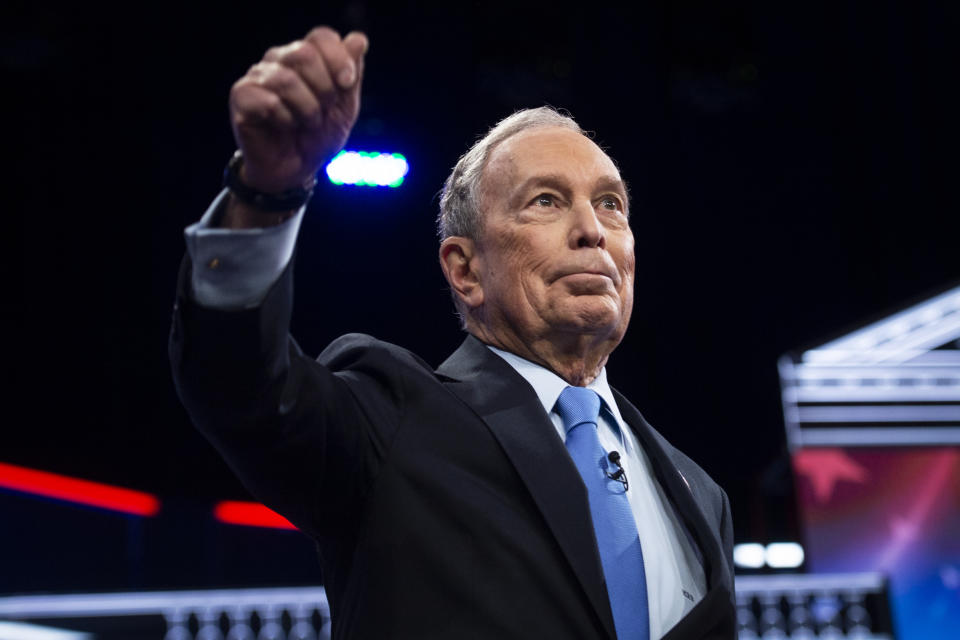Bloomberg 'weathered the storm' during fiery Democratic debate, his campaign says


LAS VEGAS, Nev. — Former New York City Mayor Michael Bloomberg came under heavy fire from his rivals during Wednesday’s Democratic presidential debate at the Paris Casino but “weathered the storm,” his senior adviser Howard Wolfson said.
“We knew that we were going to come in and the cannons were loaded for bear. He was everyone’s target. I think he weathered the storm,” Wolfson said when asked to assess Bloomberg’s night.
The debate was the first one to feature Bloomberg, a billionaire businessman who entered the presidential race last November, months after all of his opponents. In the spin room, Wolfson offered an argument the Bloomberg campaign has repeatedly made in recent days, which is that he is one of only two viable candidates in the Democratic primary, the other being Bernie Sanders.
“This is a two-person race between Mike Bloomberg and Bernie Sanders about the future direction of this party and about whether or not we’re going to be able to defeat Donald Trump,” Wolfson said.
Reporters also pressed Wolfson on the critiques Bloomberg faced from his opponents on the debate stage. In one exchange, Massachusetts Sen. Elizabeth Warren challenged Bloomberg about whether he would release women from nondisclosure agreements that prevent them from discussing allegations of harassment at Bloomberg’s company. Bloomberg responded by saying he had “no tolerance” for inappropriate behavior at his business or when he was mayor of New York City. As he rejected Warren’s call to withdraw the agreements, Bloomberg also suggested any accusations against him solely involved off-color jokes.
“We have a very few nondisclosure agreements, none of them accuse me of doing anything other than maybe they didn’t like a joke I told. These were agreements between two parties that wanted to keep it quiet and that’s up to them,” Bloomberg said. “They’ve signed those agreements and we’ll live with it.”
Wolfson, who had served as a deputy mayor in Bloomberg’s administration, was asked whether he believed Democratic voters would be satisfied with that answer.
“I think what Democrats want is somebody who takes responsibility, someone who is honest and says that there are things that he has said in his life that he regrets,” said Wolfson. “Nobody is perfect, but if you look at the kind of workplace that he has built over the years of his business and city hall, it is an inclusive workplace that values everyone and that is the kind of president he would be.”
Bloomberg also faced questions about New York’s stop-and-frisk policy in which minorities were disproportionately surveilled by the police during his mayoralty. In 2013, Bloomberg’s last year in office, a federal judge ordered the policy to be reformed and argued it violated the constitutional rights of people of color in the city. Bloomberg gave a speech apologizing for the policy before launching his presidential campaign. On the debate stage, he reiterated his regrets and suggested the program stemmed from his concern over high murder rates.

“When we discovered, I discovered that we were doing many, many, too many stop-and-frisks, we cut 95 percent of it out and I’ve sat down with a bunch of African-Americans clergy and businesspeople to talk about this, to try to learn,” Bloomberg said.
Wolfson was questioned about Bloomberg’s claim he reduced the number of police stops on his own rather than as a result of a court order.
“In the last year of the mayoralty, we dropped stops by 95 percent. That was before the court order, not after it,” Wolfson said.
Data shows the number of stops was reduced by about 64 percent in 2013, which was Bloomberg’s last year in office. That reduction came as the court case was ongoing. The Bloomberg administration defended the policy in court and Bloomberg initially vowed to fight the judge’s decision.
Due to his late entry in the Democratic presidential field, Bloomberg is not on the ballot in the first four states, including Nevada, which is holding its caucuses on Feb. 22. He will make his first appearance on the ballot on Super Tuesday, March 3, when voters will head to the polls in 14 states.
Bloomberg has already spent an unprecedented amount of his personal fortune promoting his candidacy. His campaign is hoping that a prolonged advertising blitz can help Bloomberg make up for missing the early states and propel him to victory in the remaining contests. Bloomberg has faced accusations, notably from Sanders, that he is trying to buy the election. Sanders doubled down on those attacks during the debate. Bloomberg responded to Sanders’s comments that billionaires should not exist by pointing to his charitable giving.
“All I know is I’ve been very lucky, made a lot of money, and I’m giving it all away to make this country better,” said Bloomberg.
With an estimated net worth of over $60 billion, Bloomberg has given over $10 billion to philanthropic and political causes over the years. Wolfson was also pressed about how Bloomberg’s claim that he is giving “it all away” squares with the vast wealth he has maintained.
“I don’t know, if you want to quibble with the fact that the guy’s given away billions of dollars a year, you’re welcome to do that,” said Wolfson.
Overall, Wolfson said the debate showed “a very clear and distinct contrast” between Bloomberg’s vision and Sanders’s progressive policies. While Sanders is calling for universal health care, free public education, and wealth taxes designed to reduce income inequality, Bloomberg has advocated more moderate reforms in each of these areas.
Wolfson said Bloomberg proved he is “best able to take on” President Trump and suggested Sanders has gotten “a pass” from questions about his record.
“He does not like when people challenge him on his record,” Wolfson said of Sanders. “Everybody was coming to get under Mike Bloomberg’s skin; when Mike Bloomberg dared criticize Bernie Sanders, it looked like he was flying through the stage at him.”
_____
Read more from Yahoo News: